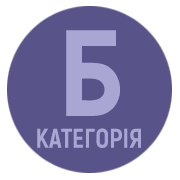NEXT-GENERATION LEXICOGRAPHIC TOOLS: FROM LEXICOGRAPHIC HERITAGE TO INNOVATIVE DIDACTIC PRACTICE
DOI:
https://doi.org/10.32782/philspu/2025.10.14Keywords:
microdictionary; POLYHEDRON; lexicography; language teaching; corpus analysis; linguistic competence; Sketch Engine; digital technologies in education; conceptography; terminographyAbstract
This article examines the evolution of lexicographic practices–from fundamental electronic dictionaries developed bythe Ukrainian Lingua-Information Foundation of the National Academy of Sciences of Ukraine (ULIF) to the latest innovative educational resources, in particular microdictionaries created in the POLYHEDRON platform ecosystem. Particular attention ispaid to the pedagogical and cognitive potential of these resources in the context of developing the linguistic competence of studentsstudying the Ukrainian language. The article demonstrates how new-generation lexicographic tools can combine academic heritage,corpus methods, visual annotation technologies, personalized knowledge presentation formats, and the principles of conceptography inherent in modern digital education in the humanities. It shows how new dictionary formats transform traditional teaching methods and increase the effectiveness of linguistic material assimilation by activating students' creative potential and promoting theirindependent research activities.The article considers an example of a micro-dictionary compiled by Diana-Maria Fedoriv, a student of the Master's program “Applied Linguistics” at Ivan Franko National University of Lviv, Diana-Maria Fedoriv, as part of her research on “The pragmatic potential of texts about love in the formation of linguistic competence in foreigners (using the example of texts by Ivan Franko and Lesya Ukrainka, Edith Wharton, and Henry James).” The author uses the Sketch Engine platform to create a corpus of specialized texts, identify key terms based on frequency analysis, perform CQL queries, and conduct concordance searches. Five terms: text, linguistic personality,text creation, informational text, and competence – became the conceptual basis of the dictionary. Each dictionary entry is structuredas a miniature capsule of knowledge, combining definitions from scientific sources, examples of usage in the corpus, empathetic author's comments, illustrations, and emojis for visual support of perception. This model of knowledge presentation facilitates the interculturaladaptation of foreign students, makes terms more accessible for learning, and promotes a deeper understanding of language and culture.The work emphasizes the role of POLYHEDRON as an intellectual infrastructure that enables the creation of multimodal, flexible, and adaptive lexicographic products for use in the educational process. Such micro-dictionaries perform a number of functions: they form terminological literacy, stimulate reflection, and promote academic socialization and intercultural communication. In conclusion, it is shown that new dictionary formats can be not only tools for acquiring knowledge, but also means of producing meaning and building a personal learning trajectory.
References
Словники України [Електронний ресурс] / Український мовно-інформаційний фонд НАН України. Київ, 2001–2025. URL: https://lcorp.ulif.org.ua/dictua/ (дата звернення: 27.06.2025).
Curry N., McEnery T. Corpus linguistics for language teaching and learning: A research agenda. Language Teaching. 2025. С. 1–20. DOI: https://doi.org/10.1017/S0261444824000430.
Incelli E. Exploring the future of corpus linguistics: Innovations in AI and social impact. International Journal of Mass Communication. 2025. Vol. 3. С. 1–10. DOI: https://doi.org/10.6000/2818-3401.2025.03.01.
Campoy-Cubillo M. C. Fostering learners' online dictionary skills through active dictionary rubrics. Lexikos. 2021. Vol. 31, № 1. С. 487–510. DOI: https://doi.org/10.5788/31-1-1663.
Свідоцтво про авторське право на твір №96078 від 17.02.2020 р. Комп’ютерна програма «Когнітивна ІТ платформа ПОЛІЕДР» («КІТ ПОЛІЕДР») («POLYHEDRON») / О. Є. Стрижак, В. Ю. Величко, В. В. Приходнюк, М. В. Надутенко, В. В. Горборуков, О. В. Франчук, О. В. Палагін, В. А. Широков, Г. М. Потапов, К. С. Мала- хов, В. В. Каверинський, С. О. Довгий, О. В. Лісовий, І. Б. Чепков. Офіційний бюлетень №57 (31.03.2020). С. 402–403.
Гордієнко Н. Г. Сучасна лексикографія як об’єкт лінгвістики. Українська мова. 2011. № 3. С. 67–73.
Перебийніс В. І. Лексикографічне забезпечення навчального процесу з іноземної мови. Вісник Київ. держ. лінгв. ун-ту. Сер. «Філологія». 1999. Т. 2, № 1. С. 12–19.
Тараненко О. О. Новий словник української мови. Концепція і принципи укладання словника. Ін-т укр. мови НАН України, Центр мовознав. студій. К.; Кам’янець-Поділ. : [б. в.], 1996. 172 с.
Широков В. А. Елементи лексикографії. К. : Довіра, 2005. 304 с.
Лінгвістично-інформаційні студії : праці Українського мовно-інформаційного фонду НАН України : у 5 т. В. А. Широков та ін. Т. 1−5 . Київ. Український мовно-інформаційний фонд НАН України. 2018. URL: https://movoznavstvo.org.ua/files/Ling_inf_studio_TOM_5_umif_B5.pdf.
Надутенко М. В., Надутенко М. В., Фаст О. Л. Інноваційні мовні технології та штучний інтелект: розробка та застосування платформи Polyhedron на основі українських лексикографічних теорій. Академічні студії. Серія «Педагогіка», 2024 (3), 103−111. DOI https://doi.org/10.52726/as.humanities/2024.3.6.
Надутенко М. В., Надутенко М. М., Фаст О. Л. Тріада «Інтелектуалізація – Віртуалізація – Великі дані»: міждисциплінарні аспекти природомовних досліджень та перспектив докторської освіти. Академічні студії. Серія «Педагогіка», 2024 (2), 38−48. DOI: https://doi.org/10.52726/as.pedagogy/2024.2.14.
Guo X. Multimodality in language education: Implications of a multimodal affective perspective in foreign language teaching. Frontiers in Psychology. 2023. Vol. 14. Article 1283625. DOI: https://doi.org/10.3389/fpsyg.2023. 1283625.
Zhu T., Zhang Y., Irwin D. Second and foreign language vocabulary learning through digital reading: A meta-analysis. Education and Information Technologies. 2023. Vol. 29. С. 4531–4563. DOI: https://doi.org/10.1007/s10639-023-11969-1.
Федорів Д.-М. Словник лінгвістичних термінів [Електронний ресурс] : мікрословник до магістерського дослідження «Прагматичний потенціал текстів про кохання у формуванні лінгвістичної компетентності іноземців (на прикладі текстів Івана Франка та Лесі Українки, Едіт Вортон та Генрі Джеймса)» / Д.-М. Федо- рів ; Львівський національний університет імені Івана Франка. URL: https://e-devel.ulif.org.ua/viewer/?sharedgraph=68435245d1c1a&view=prism (дата звернення: 27.06.2025).
Guaqueta C. A., Castro-Garces A. Y. The use of language learning apps as a didactic tool for EFL vocabulary building. English Language Teaching. 2018. Vol. 11, № 2. С. 61–71. DOI: https://doi.org/10.5539/elt.v11n2p61.








